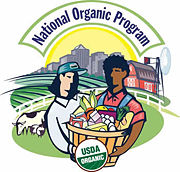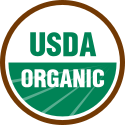
National Organic Program
Encyclopedia


United States
The United States of America is a federal constitutional republic comprising fifty states and a federal district...
, the National Organic Program (NOP) is the federal regulatory framework governing organic food
Organic food
Organic foods are foods that are produced using methods that do not involve modern synthetic inputs such as synthetic pesticides and chemical fertilizers, do not contain genetically modified organisms, and are not processed using irradiation, industrial solvents, or chemical food additives.For the...
. It is also the name of the organization in the Department of Agriculture
Agriculture
Agriculture is the cultivation of animals, plants, fungi and other life forms for food, fiber, and other products used to sustain life. Agriculture was the key implement in the rise of sedentary human civilization, whereby farming of domesticated species created food surpluses that nurtured the...
(USDA
United States Department of Agriculture
The United States Department of Agriculture is the United States federal executive department responsible for developing and executing U.S. federal government policy on farming, agriculture, and food...
) responsible for administering and enforcing the regulatory framework. The Organic Food Production Act of 1990 (7 U.S.C.A. § 6501-22) required that the USDA develop national standards for organic products. The NOP Final Rule was published in the Federal Register in 2000.
NOP regulations cover in detail all aspects of food production
Production, costs, and pricing
The following outline is provided as an overview of and topical guide to industrial organization:Industrial organization – describes the behavior of firms in the marketplace with regard to production, pricing, employment and other decisions...
, processing
Food processing
Food processing is the set of methods and techniques used to transform raw ingredients into food or to transform food into other forms for consumption by humans or animals either in the home or by the food processing industry...
, delivery and retail
Retail
Retail consists of the sale of physical goods or merchandise from a fixed location, such as a department store, boutique or kiosk, or by mail, in small or individual lots for direct consumption by the purchaser. Retailing may include subordinated services, such as delivery. Purchasers may be...
sale. Under the NOP, farmer
Farmer
A farmer is a person engaged in agriculture, who raises living organisms for food or raw materials, generally including livestock husbandry and growing crops, such as produce and grain...
s and food processors who wish to use the word
Word
In language, a word is the smallest free form that may be uttered in isolation with semantic or pragmatic content . This contrasts with a morpheme, which is the smallest unit of meaning but will not necessarily stand on its own...
"organic" in reference to their business
Business
A business is an organization engaged in the trade of goods, services, or both to consumers. Businesses are predominant in capitalist economies, where most of them are privately owned and administered to earn profit to increase the wealth of their owners. Businesses may also be not-for-profit...
es and product
Product (business)
In general, the product is defined as a "thing produced by labor or effort" or the "result of an act or a process", and stems from the verb produce, from the Latin prōdūce ' lead or bring forth'. Since 1575, the word "product" has referred to anything produced...
s, must be certified organic. Producers with annual sales not exceeding $5,000 US are exempted and do not require certification (however, they must still follow NOP standards, including keeping records and submitting to a production audit
Audit
The general definition of an audit is an evaluation of a person, organization, system, process, enterprise, project or product. The term most commonly refers to audits in accounting, but similar concepts also exist in project management, quality management, and energy conservation.- Accounting...
if requested, and cannot use the term certified organic). A USDA
United States Department of Agriculture
The United States Department of Agriculture is the United States federal executive department responsible for developing and executing U.S. federal government policy on farming, agriculture, and food...
Organic seal identifies products with at least 95% organic ingredients.
There are currently 56 U.S. domestic certification agencies accredited by the USDA, including Organic Crop Improvement Association
Organic Crop Improvement Association
The Organic Crop Improvement Association is a member-owned, nonprofit organization, which provides research, education and certification services to organic growers, processors and handlers around the world. OCIA certifies farm, livestock, processor/handlers, broker-traders, Community Grower...
, CCOF, Oregon Tilth
Oregon Tilth
Oregon Tilth is an American nonprofit membership organization dedicated to supporting and advocating organic food and farming, based in Corvallis, Oregon...
, Quality Assurance International
Quality Assurance International
Quality Assurance International is a U.S.-based international organic certification company that is authorized by the United States Department of Agriculture as “a USDA-accredited certifying agent that operates globally to certify organic operations to National Organic Program standards.” It is...
(QAI), and Indiana Certified Organic. There are also 41 accredited foreign agencies that offer organic certification
Organic certification
Organic certification is a certification process for producers of organic food and other organic agricultural products. In general, any business directly involved in food production can be certified, including seed suppliers, farmers, [food] processors, retailers and restaurants.Requirements vary...
services.
The NOP covers fresh and processed agricultural food
Food
Food is any substance consumed to provide nutritional support for the body. It is usually of plant or animal origin, and contains essential nutrients, such as carbohydrates, fats, proteins, vitamins, or minerals...
products, including crops
Agriculture
Agriculture is the cultivation of animals, plants, fungi and other life forms for food, fiber, and other products used to sustain life. Agriculture was the key implement in the rise of sedentary human civilization, whereby farming of domesticated species created food surpluses that nurtured the...
and livestock
Livestock
Livestock refers to one or more domesticated animals raised in an agricultural setting to produce commodities such as food, fiber and labor. The term "livestock" as used in this article does not include poultry or farmed fish; however the inclusion of these, especially poultry, within the meaning...
. It does cover non-food products that may be sold as organic, including natural
Nature
Nature, in the broadest sense, is equivalent to the natural world, physical world, or material world. "Nature" refers to the phenomena of the physical world, and also to life in general...
fiber
Fiber
Fiber is a class of materials that are continuous filaments or are in discrete elongated pieces, similar to lengths of thread.They are very important in the biology of both plants and animals, for holding tissues together....
s (eg: organic cotton
Cotton
Cotton is a soft, fluffy staple fiber that grows in a boll, or protective capsule, around the seeds of cotton plants of the genus Gossypium. The fiber is almost pure cellulose. The botanical purpose of cotton fiber is to aid in seed dispersal....
). Health
Health
Health is the level of functional or metabolic efficiency of a living being. In humans, it is the general condition of a person's mind, body and spirit, usually meaning to be free from illness, injury or pain...
and beauty
Beauty
Beauty is a characteristic of a person, animal, place, object, or idea that provides a perceptual experience of pleasure, meaning, or satisfaction. Beauty is studied as part of aesthetics, sociology, social psychology, and culture...
products (eg: organic shampoo
Shampoo
Shampoo is a hair care product used for the removal of oils, dirt, skin particles, dandruff, environmental pollutants and other contaminant particles that gradually build up in hair...
) can also be labeled organic if compliant with NOP. The USDA NOP does have the authority to enforce organic standards in the realm of health and beauty products, and were encouraged to do so in a 2009 recommendation from the USDA National Organic Standards Board. While the actual law does apply to these products, enforcement remains limited in this market.
The National Organic Program grew from fewer than twelve total employees in 2008 to approximately thirty in 2010. As of April 2011, it operates in three divisions: Standards, Accreditation and International Activities (AIA), and Compliance and Enforcement.
In August 2008 the NOP announced that 15 of 30 federally accredited organic certifiers had been placed on probation for various violations of USDA organic standards.
External links
- Standards of the National Organic Program - All the details of organic standards from the Electronic Code of Federal Regulations. Includes national list of prohibited and allowed substances (Subpart G).
- The National Organic Program - Official USDA site, includes full text of the standards and regulations.
- 38 Non-Organic Ingredients Found in 'USDA Organic' Foods
- Organic Standards Database to compare the EU regulation on organic farming, the National Organic Program (NOP) of the US and the guidelines for the production, processing, labeling and marketing of organically produced food of the Codex Alimentarius

